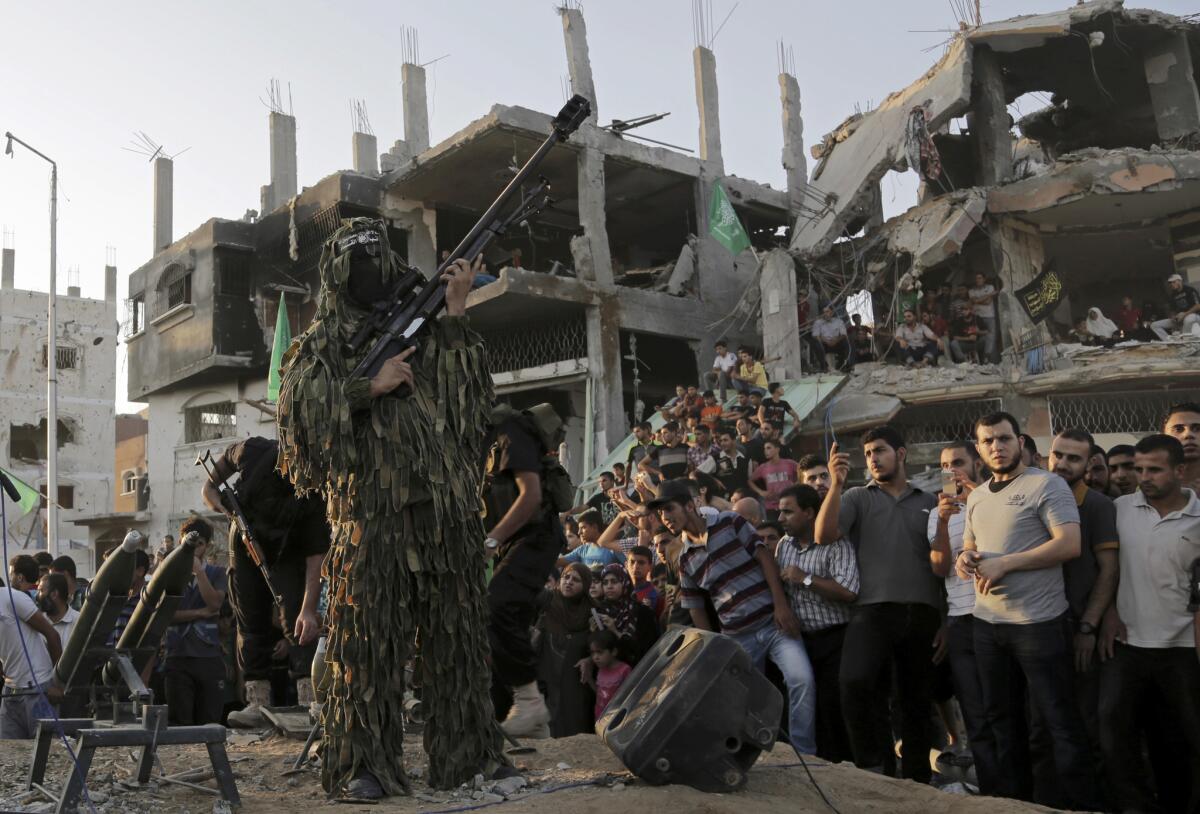Gaza truce holds as Israelis debate what was won and lost

- Share via
Reporting from Tel Aviv — The cease-fire that ended 50 days of fighting between Israeli forces and Palestinian militants in the Gaza Strip held Wednesday past the 24-hour mark, but Israel’s wartime solidarity quickly gave way to a round of angry political recriminations.
Prime Minister Benjamin Netanyahu, appearing on the defensive, declared in a nationally televised news conference that Israel had “great military and diplomatic achievements” stemming from the conflict, while Hamas, the militant faction that controls Gaza, had gained nothing.
“We set a clear objective: to deliver a heavy blow to Hamas,” he said. “And I can say that Hamas has indeed been hit severely.”
But right-wing politicians denounced the prime minister for merely having weakened, but not destroyed, Hamas.
“So long as Hamas exists, there can be no arrangement,” Foreign Minister Avigdor Lieberman wrote in a Facebook post. “So long as Hamas controls Gaza, Israeli citizens cannot be guaranteed security, and reaching a diplomatic arrangement is impossible. ... Despicable murderers should not and cannot be trusted.”
In Israel’s south, where mortar fire fatally wounded three men shortly before the truce took effect, local leaders voiced bitterness over what they viewed as an insufficiently forceful response to relentless rocket and mortar fire from the coastal territory. Sixty-four Israeli soldiers and six civilians died in the fighting.
Israeli analysts said Hamas’ military capabilities had been seriously eroded by the fighting, but acknowledged that the conflict had been bruising for Israel as well.
“These are the guys we have been fighting with for 50 days now, as the economy takes a hit, tourism is collapsing ... and until the last moment, everyone has been biting their nails over the question of if [Hamas leader] Khaled Meshaal would finally be so kind as to agree to stop shooting at us,” columnist Ben Caspit wrote in the Maariv newspaper.
In Gaza, where Hamas had led nighttime celebrations Tuesday of what it declared to be a great victory, the harsh light of day on Wednesday brought war-weary residents face-to-face with the enormous cost of the conflict.
Many Palestinians who had hidden in their homes during the final ferocious days of Israeli bombardment viewed for the first time the mountainous piles of rubble that were the wreckage of high-rise buildings and smaller structures surrounding them. By United Nations estimates, seven weeks of fighting left 2,143 Palestinians dead, most of them civilians, and destroyed more than 17,000 homes.
Under Tuesday’s accord, Hamas gained little beyond the terms of an Egyptian truce proposal that had been in place since the early weeks of the conflict. Under the cease-fire pact, material for reconstruction will be allowed into the territory, and fishermen will have access to a six-mile offshore zone. But the group’s demands for a seaport and an airport will have to wait for substantive negotiations set to begin in a month.
Wednesday brought new disclosures about the political maneuvering that led to Tuesday’s truce. Israeli media said Netanyahu had refrained from submitting the pact for a formal vote by his security Cabinet, made up of ministers whose posts have a direct bearing on military and national-security matters, because he feared being voted down.
Hamas leaders who had gone into hiding during the conflict reappeared. One leader, Ismail Haniyeh, addressed a joyous crowd Wednesday in Gaza, telling them, “There are not enough words and speeches to express this victory.”
In Gaza City, some of those displaced from their homes literally danced with joy at word of the cease-fire. An extended family of 70 people from the devastated Shejaiya district that had taken shelter at the offices of a humanitarian group packed up and made ready to go home -- joining throngs of returnees jamming the streets.
But there was disagreement over whether the fighting had achieved anything. Amjad Akila, a 23-year-old member of a family from Shejaiya, declared his pride in Hamas and other militant groups.
“The resistance forced Israel to agree to its demands!” he said happily. “This is victory.”
But a friend -- afraid to give his name because his opinion was unpopular -- argued with Akila, saying the deaths and displacement of so many had been too high a price to pay.
Already, though, there were some small signs of change. The U.N.’s World Food Program reported that it had been able to deliver a shipment of supplies via the Rafah crossing in Egypt for the first time in seven years. Israel and Egypt imposed blockades on Gaza after Hamas ejected the Palestinian Authority and seized control of the territory in 2007.
Special correspondent Sobelman reported from Jerusalem. Special correspondents Abeer Ayyoub in Gaza City and Maher Abukhater in Ramallah, West Bank, contributed to this report.
Follow @laurakingLAT for news out of the Middle East on Twitter
More to Read
Sign up for Essential California
The most important California stories and recommendations in your inbox every morning.
You may occasionally receive promotional content from the Los Angeles Times.










